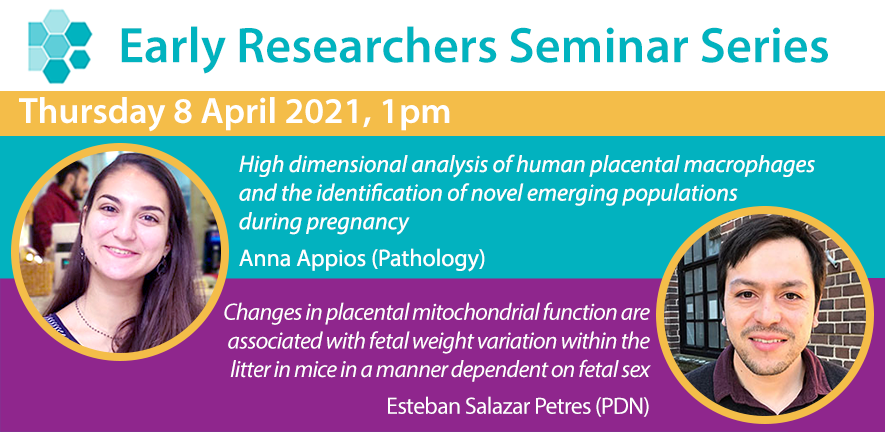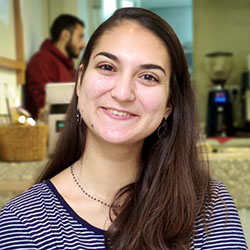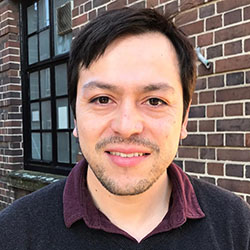
Thursday 8 April 2021, 1pm - 2pm
High dimensional analysis of human placental macrophages and the identification of novel emerging populations during pregnancy
Anna Appios (Pathology)
Changes in placental mitochondrial function are associated with fetal weight variation within the litter in mice in a manner dependent on fetal sex
Esteban Salazar Petres (PDN)
Chair: Dr Irving Aye (Obstetrics & Gynaecology)
The Early Researchers Seminar Series (ERSS) is a platform for PhD Students and early career researchers (ECRs) at the University of Cambridge with research foci on reproduction to share and discuss their research with other academics from a range of disciplines also researching reproduction at the University. Seminars are held on Zoom on the second Thursday of every month, 1pm - 2pm. For more information, and for the full 2020 - 2021 programme, please see the main ERSS page.
Speakers and abstracts
High dimensional analysis of human placental macrophages and the identification of novel emerging populations during pregnancy
Anna Appios (Pathology)
The human placenta is made up of villous trees that are the fundamental units responsible for maternal-fetal exchange. Fetal macrophages, termed Hofbauer cells (HBC), are abundant within placental villi but have been largely overlooked in the field of reproductive immunology. The phenotype and function of HBC throughout gestation remains poorly described. Using a combination of techniques such as mass cytometry, whole mount immunofluorescence imaging and ex vivo live imaging we have found that HBC properties change during the course of pregnancy. Specifically, we have found that the phenotype, morphology and motility of HBC are altered between first trimester and full-term placentas. This work highlights the function and characteristics of HBC in the healthy human placenta and could provide further insight into how these might change with placental disorders such as pre-eclampsia or gestational diabetes.
Anna Appios completed an MSc in Infection & Immunity at University College London (2016) where she first gained an interest in reproductive immunology. She is currently a third year PhD student under the supervision of Dr Naomi McGovern in the Department of Pathology, University of Cambridge. Her research focuses on using high dimensional techniques such as mass cytometry to characterise fetal macrophages, termed Hofbauer cells (HBC), in the human placenta and understand how their properties and functions change over the course of pregnancy.
Changes in placental mitochondrial function are associated with fetal weight variation within the litter in mice in a manner dependent on fetal sex
Esteban Salazar Petres (PDN)
Mitochondria are the energy powerhouses within cells. Previous work has shown that in the placenta, mitochondria alter their function to help support fetal growth both during normal gestation and in response to adverse conditions. Additionally, there are sex-specific differences in the placenta and fetal/neonatal morbidity and mortality. However, little is known about the influence of fetal sex in determining placental mitochondrial capacity during development and its relation to fetal weight. This study in mice investigated whether changes in mitochondrial function in the transport region of the placenta relate to the weight fetuses of each sex within the litter. We find that there are changes in placental mitochondrial function and related gene and protein expression that are associated with fetal weight variations within the litter. However, the specific nature of these changes depends on fetal sex. These data may be useful for the development of sex-specific treatments to improve fetal/neonatal outcomes.



